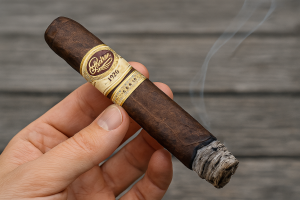How to Start Your Own Cigar Brand: From Concept to Market Success

Starting your own cigar brand can be a rewarding venture, combining a passion for the craft with the entrepreneurial spirit.
The global cigar market is significant, valued at approximately $22.5 billion in 2020, and projected to reach $28.13 billion by 2027, expanding at a CAGR of 4.2% (Source: Fortune Business Insights).
This potential for growth offers a lucrative opportunity for aspiring cigar entrepreneurs. This blog post outlines how to start your own cigar brand successfully.
Starting Your Cigar Brand from Scratch
To start your own cigar brand is an exciting venture that requires careful planning, a solid understanding of the cigar industry, and a commitment to quality. In this section, we’ll walk you through the seven essential steps to bring your unique cigar brand to life, from concept development to distribution.
1. Understand the Cigar Market
Conducting thorough market research and clearly defining your target audience are essential first steps in building a successful cigar brand, as they help you understand industry trends and cater to the specific preferences of your ideal customers.
- Market Research
Investigate current trends, consumer preferences, and competitive landscapes. Tools like IBISWorld and Statista provide industry reports that can help you gain insights into market dynamics. - Target Audience
Identify your target demographic. Are you catering to seasoned cigar aficionados, casual smokers, or new entrants? Understanding your audience will guide your product development and marketing efforts.
2. Create a Unique Brand Identity
Establishing a strong brand identity through a memorable name, authentic storytelling, and luxurious packaging is essential for success in the cigar market.
- Brand Name and Logo
Choose a memorable name that resonates with your audience. Your logo should reflect the quality and essence of your cigars. - Storytelling
Develop your brand's story. Consumers in the cigar market appreciate authenticity and narratives that connect them to the product. - Packaging
Invest in high-quality packaging that conveys luxury and craftsmanship. The visual presentation of your cigar plays a crucial role in capturing customer attention.
3. Develop Your Product Line
To successfully launch your cigar brand, focus on product development by collaborating with skilled cigar makers, understanding legal regulations, and conducting thorough testing with focus groups and blind taste tests.
- Product Development
Collaborate with experienced cigar makers to create unique blends. Visit regions like Nicaragua and the Dominican Republic to source high-quality tobacco. - Legal Considerations
Familiarize yourself with the regulations surrounding tobacco products in your jurisdiction. This includes obtaining the necessary licenses and adhering to health warnings. - Testing
Run focus groups and blind taste tests to gather feedback on your blends before launching.
4. Establish Production
When establishing your cigar brand, it's crucial to choose between in-house production and partnering with experienced manufacturers while also implementing stringent quality control protocols to ensure product consistency and compliance with industry standards.
- Manufacturing Partnerships
Decide whether to produce cigars in-house or partner with established manufacturers. Many new brands opt for the latter to ensure quality and compliance with industry standards. - Quality Control
Implement strict quality control protocols to maintain consistency across your product line. This includes monitoring the aging process and ensuring proper humidity levels.
5. Develop a Marketing Strategy
Successfully launch your cigar brand by defining your market position, building a strong digital presence, and utilizing public relations strategies for visibility.
- Brand Positioning
Position your brand effectively in the market. Are you a luxury premium brand or a more accessible option? Your positioning will influence your marketing tactics. - Digital Presence
Establish a professional website and engage with potential customers on social media platforms. Visual platforms like Instagram are especially effective for showcasing your cigars. - Public Relations
Consider leveraging PR strategies to gain media exposure. Events like cigar festivals or collaborations with local bars can be effective ways to promote your brand.
6. Build Distribution Channels
To enhance sales, build retail partnerships, consider e-commerce options, and explore subscription services for your cigar brand.
- Retail Partnerships
Establish relationships with cigar shops and lounges for retail distribution. Offering samples can entice retailers to carry your brand. - E-commerce
Consider launching an online store. In 2020, the online cigar market grew significantly, driven by the COVID-19 pandemic, making e-commerce a viable sales channel. - Subscription Services
Explore subscription box models, allowing customers to experience a curated selection of your cigars monthly.
7. Engage with the Cigar Community
Engage in networking at industry events and gather customer feedback through surveys and social media to enhance your cigar brand's offerings.
- Networking
Attend industry events, trade shows, and tastings to connect with other cigar enthusiasts and professionals. - Customer Feedback
Create a feedback loop with your customers. Utilize surveys or social media platforms to gather insights and improve your product offerings.

Navigating Legal and Regulatory Requirements
To build a successful cigar brand, it's essential to navigate the legal and regulatory landscape carefully. The tobacco industry is highly regulated, and understanding these requirements can help you avoid complications and establish credibility in the market.
1. Obtain the Necessary Licenses and Permits
- Federal Licensing: In many countries, tobacco manufacturers and distributors need to acquire specific federal licenses. In the United States, for example, businesses must register with the Alcohol and Tobacco Tax and Trade Bureau (TTB).
- State and Local Permits: Depending on your location, you may also need additional state or local permits to operate legally. This could include sales permits, import licenses, and manufacturing authorizations.
- Pro Tip: Work with a legal advisor familiar with tobacco regulations to ensure you’re fully compliant at all levels.
2. Understand Labeling and Health Warning Requirements
- Health Warnings: Most countries require that cigars carry health warnings on their packaging. These regulations vary by location, so it’s crucial to be aware of what’s required in your target market.
- Ingredient Disclosure: Some regions mandate the disclosure of ingredients, additives, or manufacturing processes on cigar labels. This transparency can help establish trust with consumers while meeting legal standards.
- Pro Tip: Use high-quality design that accommodates these requirements without compromising the aesthetic appeal of your packaging.
3. Compliance with Advertising Restrictions
- Age Restrictions: All advertising and marketing for cigars must comply with age restrictions, ensuring content is targeted solely at adult audiences. This applies to both online and offline marketing.
- Platform-Specific Guidelines: Social media platforms have unique advertising policies for tobacco products. Make sure to adhere to these guidelines to avoid account suspensions or advertising restrictions.
- Pro Tip: Use age-gated websites and opt-in content for email marketing to comply with age verification rules while engaging with your audience.
4. Stay Updated on Import and Export Regulations
- Import Regulations: If you source tobacco internationally, understand the import duties, taxes, and regulations for bringing tobacco products into your country.
- Export Requirements: For brands looking to expand globally, familiarize yourself with export rules and market-specific regulations in your target countries.
- Pro Tip: Partner with a reliable logistics company that specializes in handling tobacco products to streamline the import/export process.
Common Mistakes to Avoid When Starting a Cigar Brand
Launching a cigar brand can be incredibly rewarding, but there are pitfalls that can hinder your success. Avoiding these common mistakes can help ensure that your brand stands out and operates smoothly in the competitive cigar industry.
1. Neglecting Market Research
- Mistake: Skipping thorough market research can lead to products that don’t resonate with your target audience. Entering the market without understanding consumer preferences and competition may result in low sales and brand misalignment.
- Solution: Invest time in understanding the trends, demographics, and preferences of cigar enthusiasts. Conduct surveys or leverage data platforms to gain valuable insights.
2. Compromising on Quality
- Mistake: In the pursuit of cost savings, some entrepreneurs may compromise on the quality of tobacco or manufacturing processes. Poor quality can lead to negative customer feedback and damage your brand’s reputation.
- Solution: Source high-quality tobacco and work with skilled manufacturers to ensure your cigars meet high standards. Quality should always be a top priority.
3. Inconsistent Branding
- Mistake: Inconsistent branding can confuse potential customers and weaken brand recognition. Lack of cohesion between your packaging, logo, and messaging dilutes your identity and positioning in the market.
- Solution: Create a strong, cohesive brand identity that resonates with your target audience. Use consistent colors, fonts, and tone across all your materials and channels.
4. Ignoring Regulatory Requirements
- Mistake: Failing to comply with legal and regulatory requirements can result in fines, recalls, or even the shutdown of your business. Tobacco regulations are strict, and non-compliance can quickly derail your progress.
- Solution: Consult a legal expert to ensure you understand and comply with all federal, state, and local regulations related to tobacco sales and marketing.
5. Overlooking Marketing and Distribution
- Mistake: Underestimating the importance of a strong marketing strategy and reliable distribution channels can limit your brand’s visibility and accessibility. Without a clear plan, you may struggle to reach your audience and build a customer base.
- Solution: Dedicate a portion of your budget to marketing efforts and build relationships with retailers and online platforms. Consider e-commerce options and partnerships with cigar lounges to expand your reach.
6. Underestimating Financial Requirements
- Mistake: Starting a cigar brand can be capital-intensive, and underestimating costs can lead to financial strain. Many new brands fail due to lack of proper financial planning and inadequate capital.
- Solution: Develop a comprehensive business plan that outlines initial and ongoing costs. Secure sufficient funding to cover product development, marketing, compliance, and operating expenses.
Turn Your Cigar Brand Vision into Reality
Starting your own cigar brand is a rewarding venture that blends passion with entrepreneurship. By conducting thorough research, creating a strong brand identity, and adhering to quality and compliance standards, you can set the stage for a successful launch.
Remember, patience and attention to detail are key to building a brand that resonates with cigar enthusiasts.
Every trailblazer deserves a moment to savor. Let our premium cigars be part of your journey to success.
Key Takeaways:
- Begin with a limited product line to test the market, instead of launching a wide range of products. For more insights, check out our guide on starting your own cigar brand.
- Allocate at least 20% of your startup budget to marketing efforts to build brand awareness. Explore effective strategies in our section on cigar marketing techniques.
- Keep abreast of industry trends and regulations, as the cigar market evolves continuously.
- The cigar industry thrives on quality. Never compromise on the materials or processes used in crafting your cigars.















